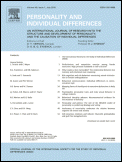 | |
| Discipline | Personality psychology |
|---|---|
| Language | English |
| Edited by | Peter K. Jonason, Julie Aitken Schermer, Aljoscha Neubauer, Michelle Yik and Colin Cooper |
| Publication details | |
| History | Since 1980 |
| Publisher | |
| Frequency | 16/year |
| 2.6 (2024) | |
| Standard abbreviations | |
| ISO 4 | Pers. Individ. Differ. |
| NLM | Pers Individ Dif |
| Indexing | |
| CODEN | PEIDD9 |
| ISSN | 0191-8869 |
| LCCN | 85647765 |
| OCLC no. | 04965018 |
| Links | |
Personality and Individual Differences is a peer-reviewed academic journal published 16 times per year by Elsevier. It was established in 1980 by Pergamon Press and is the official journal of the International Society for the Study of Individual Differences. The editors-in-chief are Peter K. Jonason, Julie Aitken Schermer, Aljoscha Neubauer, Michelle Yik and Colin Cooper. Previous editors include Donald H. Saklofske, Philip A. Vernon, Gísli Guðjónsson and Sybil B. G. Eysenck. The founding editor was Hans Jürgen Eysenck. The journal covers research about the structure of personality and other forms of individual differences, the processes which cause these individual differences to emerge, and their practical applications.